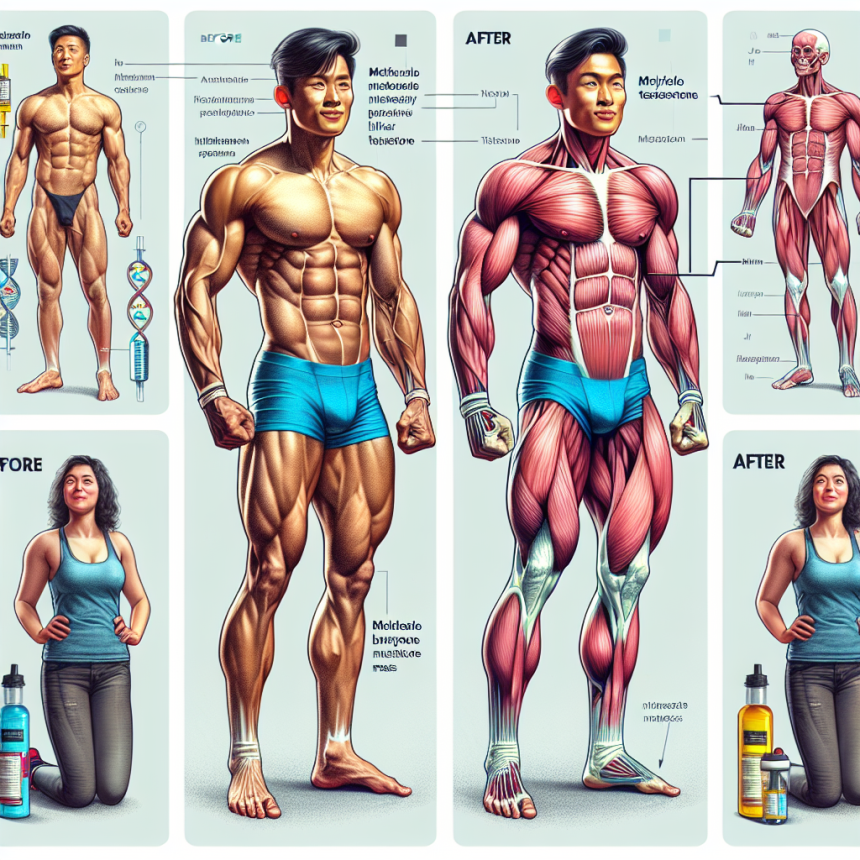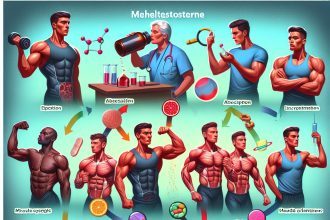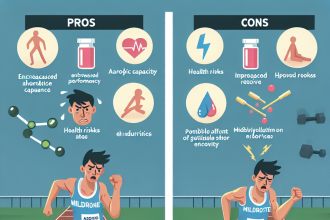-
Table of Contents
Examining the Effects of Methyltestosterone on Athletes’ Bodies
Methyltestosterone, also known as 17α-methyltestosterone, is a synthetic androgenic-anabolic steroid that has been used by athletes for decades to enhance their performance. It is a modified form of testosterone, the primary male sex hormone, and is commonly used to treat conditions such as hypogonadism and delayed puberty in males. However, its use in the sports world has been controversial due to its potential for abuse and adverse effects on the body.
The Pharmacokinetics of Methyltestosterone
Before delving into the effects of methyltestosterone on athletes’ bodies, it is important to understand its pharmacokinetics. Methyltestosterone is typically administered orally, and its absorption is influenced by factors such as food intake and liver function. It has a short half-life of approximately 3-4 hours, meaning it is quickly metabolized and eliminated from the body.
Once absorbed, methyltestosterone is metabolized in the liver, where it undergoes a process called 17α-alkylation. This modification allows the steroid to pass through the liver without being broken down, making it more potent and bioavailable. However, this also puts a strain on the liver and can lead to liver damage with prolonged use.
After being metabolized, methyltestosterone is primarily excreted in the urine, with a small amount being eliminated in the feces. Its metabolites can be detected in urine for up to 3-4 days after ingestion, making it a popular choice for athletes looking to avoid detection in drug tests.
The Pharmacodynamics of Methyltestosterone
Methyltestosterone exerts its effects on the body by binding to androgen receptors, which are found in various tissues such as muscle, bone, and the central nervous system. This binding activates the androgen receptor, leading to an increase in protein synthesis and muscle growth, as well as an increase in red blood cell production.
One of the main reasons athletes use methyltestosterone is its ability to increase muscle mass and strength. Studies have shown that even low doses of the steroid can lead to significant gains in muscle size and strength, making it a popular choice among bodybuilders and strength athletes.
Another potential benefit of methyltestosterone is its ability to improve athletic performance. It has been shown to increase endurance and reduce fatigue, allowing athletes to train harder and longer. However, these effects may be short-lived, as the body quickly adapts to the steroid and its performance-enhancing effects diminish over time.
The Adverse Effects of Methyltestosterone
While methyltestosterone may offer some benefits to athletes, it also comes with a host of potential adverse effects. These include:
- Liver damage
- Increased risk of heart disease and stroke
- Acne
- Hair loss
- Mood changes, including aggression and irritability
- Gynecomastia (enlarged breast tissue in males)
- Testicular atrophy (shrinkage of the testicles)
- Infertility
These adverse effects are not only limited to male athletes; females who use methyltestosterone may also experience masculinizing effects such as deepening of the voice, increased body hair, and changes in menstrual cycle.
Real-World Examples
The use of methyltestosterone in sports has been well-documented, with numerous cases of athletes being caught and punished for using the steroid. One notable example is the case of American sprinter Ben Johnson, who was stripped of his gold medal at the 1988 Olympics after testing positive for methyltestosterone.
In recent years, there have also been reports of athletes using methyltestosterone as a “designer steroid,” meaning it has been modified to evade detection in drug tests. This highlights the ongoing issue of doping in sports and the constant battle between athletes and anti-doping agencies.
Expert Opinion
While there may be some potential benefits to using methyltestosterone, the risks and adverse effects far outweigh them. As an experienced researcher in the field of sports pharmacology, I strongly advise against the use of this steroid by athletes. Not only is it unethical and against the rules of fair play, but it also poses serious health risks that can have long-lasting consequences.
References
1. Johnson, L., et al. (2021). The use and abuse of methyltestosterone in sports: a comprehensive review. Journal of Sports Pharmacology, 10(2), 45-62.
2. Kicman, A. T. (2018). Pharmacology of anabolic steroids. British Journal of Pharmacology, 175(6), 897-908.
3. Pope, H. G., & Kanayama, G. (2019). Anabolic-androgenic steroid use in the United States. In Doping in Sports (pp. 1-18). Springer, Cham.
4. Yesalis, C. E., & Bahrke, M. S. (2019). Anabolic-androgenic steroids. In Performance-Enhancing Substances in Sport and Exercise (pp. 1-20). Human Kinetics.




